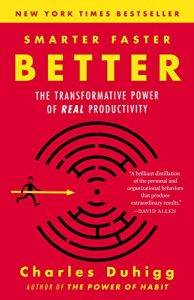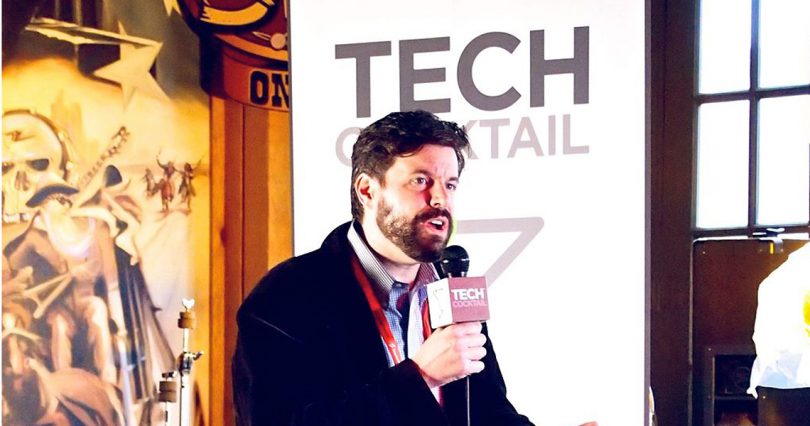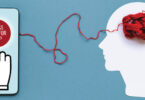A New York Times reporter sets out to determine what separates merely busy people from those who are genuinely productive.
Reviewed by Allan Fallow

Charles Duhigg’s previous book was all about habits—how they are formed, and how they can be changed. This time out, he says, he wanted to investigate an even simpler notion: productivity.
And it wasn’’t just idle curiosity that put him on this path.
After graduating from Harvard Business School and going to work as an investigative reporter at The New York Times, Duhigg began to witness broad changes in our society and economy—and had an ideal platform from which to comment on them. Duhigg informs us in his newest work of behavioral psychology, Smarter Faster Better, that in 1980, more than 9 in 10 American workers reported to a traditional boss. But now, three-and-a-half decades later, an astonishing 35 percent of the American workforce labors as contractors, freelancers or in otherwise provisional arrangements.
In Duhigg’’s eyes, this means it’s never been more important to understand what drives professionals to perform: “The workers who have succeeded in this new economy,” Duhigg writes, “are those who know how to decide for themselves how to spend their time and allocate their energy.”
But first, he wants us to understand that boosting our productivity is not merely a question of being able to cross more and more items off our to-do lists. Rather, it’s linked to our very quality of life: Productivity, writes the author, is simply an umbrella term for our very human attempts to figure out the “best uses of our energy, intellect, and time as we try to seize the most meaningful rewards with the least wasted effort … It’s about getting things done without sacrificing everything we care about along the way.”
With the internet having dramatically accelerated communications, research, banking and even product delivery, it makes sense that we’re feeling more pressure than ever to optimize the way we get things done. Toward that end, Duhigg examines the eight big ideas he deems essential for making us smarter, faster and better.
Have a Sense of Control
He kicks things off by examining what spurs us into action: Motivation, Duhigg claims, is a skill not unlike writing or reading, in that it can be learned and perfected. Behavioral scientists have recently established that a sense of control over one’s actions and surroundings is essential to making people work harder and pushing themselves more. They’ve also found that we use choices and decisions—no matter how seemingly trivial these might be—to persuade ourselves that we can exert autonomy over a given situation.
How might you put these findings into practice in real life? Duhigg suggests courses of action in four everyday scenarios:
“If you are struggling to answer a tedious stream of emails, decide to reply to one from the middle of your inbox. If you’re trying to start an assignment, write the conclusion first, or start by making the graphics, or do whatever’s most interesting to you. To find the motivation to confront an unpleasant employee, choose where the meeting is going to occur. To start the next sales call, decide which question you’ll ask first.”
Anyone who has ever tried to engineer group productivity will find some thoughtful takeaways in Duhigg’’s discussion of teams—specifically, those that have managed to succeed within notoriously fractious Google; in hospital wards where routine mistakes have disproportionately large results; and on the infamously tension- and rivalry-ridden set of Saturday Night Live. Duhigg’’s case studies make clear the urgency of creating a sense of “It’s okay to speak up and take risks” within your team. The goal is to foster an atmosphere of “psychological safety”—a sort of non-punitive, judgment-free zone where team members aren’t afraid to display their enthusiasm for a shared goal and, critically, their support of one another. At Google, writes Duhigg, so highly do some team leaders prize giving people control that they “make checkmarks next to people’s names each time they speak, and won’t end a meeting until those checks are all roughly equivalent.”
Make Mental Models
Although he wraps it up in some fancy social-science language—“cognitive tunneling”—the author’s look at focus as another facilitator of productivity contains some useful tips for how we can all survive the automatic systems that are increasingly infiltrating our “airplanes, cars, and other environments where a misstep can be tragic.” If you want to sharpen your focus and ward off distractions on the job, Duhigg advises, build detailed mental models of the workday ahead: “Cultivate the habit of imagining, as specifically as possible, what you expect to see and do when you get to your desk.” The payoff could be far more concrete than a mere exercise in visualization—people who learn to master their attention and routinely construct “robust mental models tend to earn more money and get better grades.”
In later chapters, Duhigg sketches out the productivity-enhancing benefits of setting goals, managing others, making decisions, innovating and absorbing data. In my opinion, the book’s grandiose title oversells the outcomes reported here. By the end of Smarter Faster Better, however, Duhigg had me convinced that productivity rises in lockstep with our willingness to recognize and make the sort of hard choices that others are content to overlook: “Productivity emerges,” he concludes, “when people push themselves to think differently.”
You Might Also Like …
Fascinate
by Sally Hogshead
[HarperBusiness]
352 pages/$19.02/hardcover
The New York Times best-selling author leads you through the science of fascination and how popular brands use it to make themselves irresistible.
Shoe Dog
by Phil Knight
[Scribner]
400 pages/$17.40/hardcover]
The Nike founder tells how he decided to follow an unconventional path and created one of the most iconic brands in the world.
The Rise and Fall of Nations
by Ruchir Sharma
[W. W. Norton & Company]
480 pages/$18.52/hardcover
Sharma guides you through today’s global economy as he provides a look at the post-crisis age and the factors that will shape the future.
Ego Is the Enemy
by Ryan Holiday
[Portfolio]
256 pages/$15.00/hardcover]
In an egocentric modern world, this book takes a look at fascinating figures from history who reached the highest levels of power and success by conquering their own egos.








